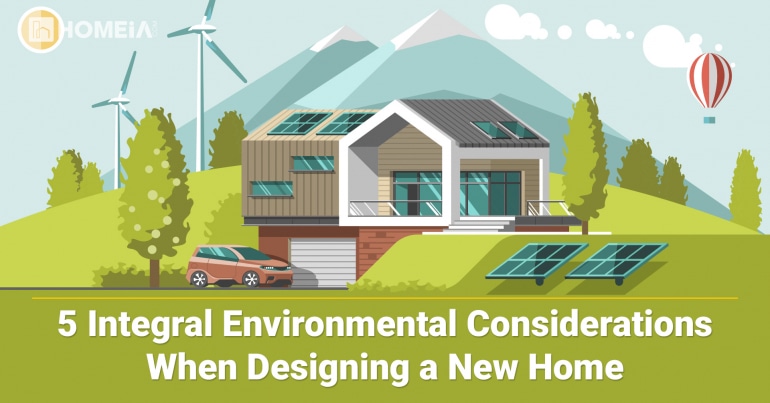What Are The Considerations For Designing Energy-efficient Industrial Facilities?

A home that is energy-efficient can save you a considerable amount of money on your monthly utility bills. By reducing the amount of energy that your home consumes, you can also reduce your carbon footprint, helping to protect the environment. If you're interested in improving the energy efficiency of your home, there are a number of considerations that you should keep in mind. Here are some key points to keep in mind:
1. Insulation
One of the most important things to consider when it comes to making your home more energy-efficient is insulation. Insulation can help prevent heat from escaping during the winter, and it can help keep the heat out during the summer. If your home is under-insulated, adding more insulation can be a great investment that will provide long-term energy savings.
2. Air Sealing
Air sealing is another important factor to consider when it comes to energy efficiency. Every home has small gaps and cracks that allow air to flow in and out. By sealing these gaps, you can prevent air leaks that can lead to a significant loss of energy. Sealing these gaps can also help make your home more comfortable.
3. Energy-Efficient Appliances
The appliances in your home can consume a significant amount of energy. If your appliances are old or inefficient, upgrading to energy-efficient models can significantly reduce your energy consumption. Over time, this can help you save a lot of money on your utility bills.
4. LED Lighting
Another simple way to reduce your energy consumption is by using LED lighting. LED lights use significantly less energy than traditional incandescent bulbs. They also last longer, which means you'll save money on replacement bulbs over time.
5. Double-Paned Windows
If your home has single-paned windows, upgrading to double-paned windows can make a big difference when it comes to energy efficiency. Double-paned windows help to prevent heat from escaping during the winter and keep cool air in during the summer. They can also help prevent noise pollution, making your home more comfortable overall.
6. Smart Thermostats
A smart thermostat is another great investment for anyone looking to improve the energy efficiency of their home. Smart thermostats allow you to control the temperature of your home remotely, which means you can adjust the temperature when you're away from home. Many smart thermostats also learn your habits and adjust the temperature automatically, helping to save energy automatically.
7. Solar Panels
While installing solar panels can be a significant investment, it can also be a great way to reduce your energy consumption over time. Solar panels allow you to generate your own energy, which means you can save money on your utility bills. They can also increase the value of your home, making them a great investment for the long-term.
8. Proper Maintenance
Finally, it's important to remember that proper maintenance is key when it comes to keeping your home energy-efficient. Regularly checking your appliances, windows, and doors can help ensure that everything is in good working order. When appliances or other features of the home need repair or replacement, it's important to take care of them promptly to prevent a significant loss of energy.
FAQs
Q: How much money can I save by making my home more energy-efficient?
A: The amount of money you can save by making your home more energy-efficient depends on a variety of factors, including the size of your home, your current energy usage, and the specific steps you take to improve energy efficiency. That being said, most homeowners find that they can save a significant amount of money on their utility bills over time by investing in energy-efficient upgrades.
Q: Are there any rebates or other incentives available for making energy-efficient upgrades to my home?
A: Many utility companies, government agencies, and other organizations offer rebates and incentives for homeowners who make energy-efficient upgrades to their homes. Some of these incentives can include tax credits, cash rebates, and energy audits.
Q: Can I make my home more energy-efficient myself, or do I need to hire a professional?
A: While some energy-efficient upgrades can be done on your own, others require the expertise of a professional. For example, upgrading your insulation or installing solar panels typically requires the help of a professional. When in doubt, it's always best to consult with an expert to ensure that the work is done correctly and safely.
Q: How long does it take to recoup the cost of energy-efficient upgrades?
A: The time it takes to recoup the cost of energy-efficient upgrades depends on a variety of factors, including the specific upgrades you make and their cost. That being said, most homeowners find that they are able to recoup the cost of energy-efficient upgrades within a few years through energy savings alone.
Q: Is it necessary to invest in all of these upgrades to make my home more energy-efficient?
A: No, it's not necessary to invest in all of these upgrades to make your home more energy-efficient. The specific steps you take will depend on your individual situation, budget, and energy goals. Consulting with an expert can help you determine which upgrades will have the most impact on your home's energy efficiency.
Q: Will making my home more energy-efficient affect its resale value?
A: Yes, investing in energy-efficient upgrades can increase the resale value of your home. Many homebuyers are interested in homes that are energy-efficient and offer long-term energy savings. This can be a great selling point when it comes time to sell your home.
By considering these key points, you can take steps to make your home more energy-efficient and start saving money on your utility bills today.



Post a Comment for "What Are The Considerations For Designing Energy-efficient Industrial Facilities?"